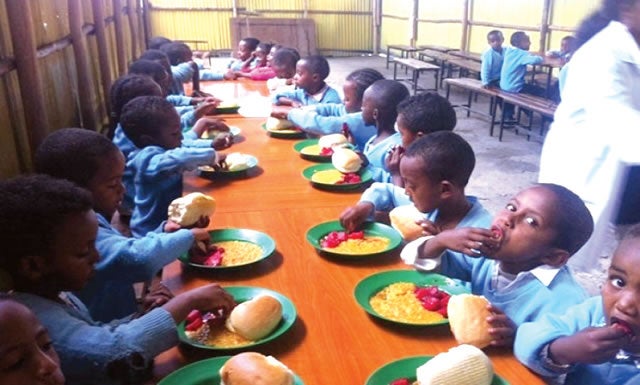By CrossRiverWatch Admin
The time was 10am at Government Primary School, Ediba Road, Calabar, the capital of Cross River State. Pupils dashed out of their classrooms as the bell tolled, signifying that it was break time.
School children ran briskly in different directions to savor the moment. On an open field at the school, some pupils, mostly between ages nine and 12, who were engrossed in playing football, could be seen hurrying gleefully after what appeared from afar like a deflated ball.
Some metres away from there, Destiny hanged out with his peers at a food stand, looking askance at the vendor. The nine-year-old Primary 4 pupil had just gobbled some N100 rice – without fish or beef. His distant look spoke of a boy, starving and sad. “I am not happy that the school has stopped feeding us,” disgruntled Destiny protested.
Destiny was part of about 300 pupils of Government Primary School, who were fed for two years under the Federal Government National Home Grown School Feeding Program before the scheme suddenly stopped in the state.
Since the program was put on hold, the boy and many of his friends from indigent homes have had to make do with the money they are given by their parents to buy food in school during break time.
“I used to enjoy the food the school prepared for us then,” he began. “I don’t know why they stopped giving us food. I don’t know when they will start giving us food again. I am not satisfied with the (quantity of) food I buy with the N100 my parents give me daily.”
The head teacher of the school, Mrs Theresa Okon, said the food vendors stopped bringing food to the school this term.
Okon explained that when she enquired from one of the vendors why the food supply was stopped, the vendor complained that they had not been paid. “Whoever owes the vendors should pay them so that they can continue to bring food for the children,” the head teacher said.
She added, “The school feeding program is a laudable program of the Federal Government that should not be stopped. The program has increased school enrolment from 280 children I met when I took over some years ago to that 400 children now. Pupils from Primary 1 to 6 were fed through the program.
“Government officials from Abuja came here and witnessed how the children were being fed and attested to the quality of food they were served. The program should be sustained.”
PUNCH gathered that the school feeding program in the state was suspended about two months ago to the disappointment of thousands of pupils and vendors who were beneficiaries.
Unfortunately, a large number of pupils were equally in Destiny’s shoes at the Estate Primary School on Atekong Drive, Calabar, where the school feeding scheme had also been stopped.
An official of the school, confirmed stoppage of the program to PUNCH.
“The government has stopped feeding the children. We heard that the program would resume after the inauguration of President Muhammadu Buhari on May 29, but up till now, nothing has happened,” the official was quoted as saying.
The state coordinator of the program, Gabe Okulaja, also told PUNCH that the program was suspended to allow for proper integration.
According to PUNCH, he said, “The program is on hold because we are integrating the national data base. We started the exercise during the (first term) holiday and we thought it would be completed before schools would resume (for the second term). We communicated this to all those who were concerned by text messages. Hopefully the integration exercise will be completed soon and the feeding will resume.”
The NHGSFP was launched in 2016 by the President Muhammadu Buhari-led administration as part of the social investment program aimed at improving the enrolment of primary schoolchildren in Nigeria and reducing the rate of dropouts from primary school, which was estimated at 30 per cent.
Since You Are Here, Support Good JournalismCrossRiverWatch was founded on the ideals of deploying tech tools to report in an ethical manner, news, views and analysis with a narrative that ensures transparency in governance, a good society and an accountable democracy. Everyone appreciates good journalism but it costs a lot of money. Nonetheless, it cannot be sacrificed on the altar of news commercialization. Consider making a modest contribution to support CrossRiverWatch's journalism of credibility and integrity in order to ensure that all have continuous free access to our noble endeavor. CLICK HERE |
New Feature: Don't miss any of our news again.Get all our articles in your facebook chat box.Click the Facebook Messenger Icon below to subscribe now
Text Advert by CRWatch :Place Yours
Will You To Learn How To Make Millions Of Naira Making Special Creams From Your Kitchen?.Click Here
Expose Your Business And Make More Sales. Advertise On CrossRiverWatch.com Today

